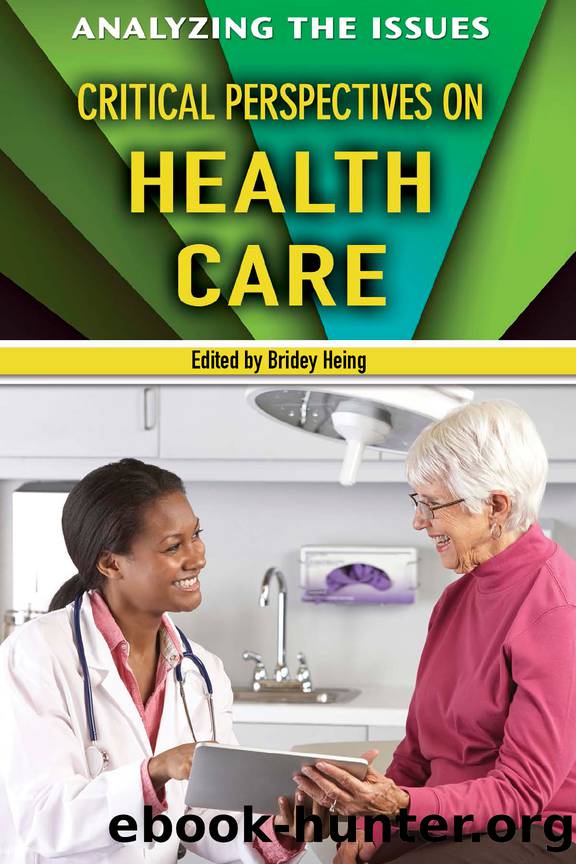Critical Perspectives on Health Care by Bridey Heing

Author:Bridey Heing
Language: eng
Format: epub
Publisher: Enslow Publishing, LLC
Published: 2019-08-27T00:00:00+00:00
CHAPTER 3
WHAT THE COURTS SAY
In recent years, the courts have weighed in on health care issues with considerable impact on how we think about these questions moving forward. The Supreme Court is a crucial source for precedent when it comes to legislation, and the limitations their decisions place on health care laws create precedent that will impact future legislation for generations to come. But the courts hear cases that ask questions more complex than simply whether we should have access to health care. Issues like religious freedom or how taxes are levied intersect with the health care debate, as well as individual rights and corporate responsibility. The court cases below remind us of the relationship between these varied subjects, and show the complex way our political culture influences health care.
EXCERPT FROM âPETITION FOR A WRIT OF CERTIORARI TO THE UNITED STATES COURT OF APPEALS FOR THE ELEVENTH CIRCUIT: UNITED STATES DEPARTMENT OF HEALTH AND HUMAN SERVICES, ET AL., PETITIONERS V STATE OF FLORIDA, ET AL.,â FROM THE US SUPREME COURT, AUGUST 12, 2011
STATEMENT
1. Congress enacted the Patient Protection and Affordable Care Act, Pub. L. No. 111-148, 124 Stat. 119 (Affordable Care Act or Act)1, to address a profound and enduring crisis in the market for health care that accounts for more than 17% of the Nationâs gross domestic product. Millions of people do not have health insurance yet actively participate in the health care market. They consume health care services for which they do not pay, and thus shift billions of dollars of health care costs to other market participants. The result is higher insurance premiums that, in turn, make insurance unaffordable to even greater numbers of people. At the same time, insurance companies use restrictive underwriting practices to deny coverage or charge more to millions of people because of pre-existing medical conditions.
a. In the Affordable Care Act, Congress addressed these problems through a comprehensive program of economic regulation and tax measures. The Act includes provisions designed to make affordable health insurance more widely available, to protect consumers from restrictive insurance underwriting practices, and to reduce the uncompensated costs of medical care obtained by the uninsured.
First, the Act builds upon the existing nationwide system of employer-based health insurance that is the principal private mechanism for financing health care. The Act establishes new tax incentives for small businesses to purchase health insurance for their employees, 26 U.S.C.A 45R2, and, under certain circumstances, prescribes tax penalties for large employers that do not offer adequate coverage to full-time employees, 26 U.S.C.A. 4980H (employer responsibility provision).
Second, the Act provides for the creation of health insurance exchanges to allow individuals, families, and small businesses to leverage their collective buying power to obtain health insurance at rates that are competitive with those of typical employer group plans.
Third, the Act establishes federal tax credits to assist eligible households with incomes from 133% to 400% of the federal poverty level to purchase insurance through the exchanges. 26 U.S.C.A. 36B. In addition, the Act expands eligibility for Medicaid to cover individuals with income below 133% of the federal poverty level.
Download
This site does not store any files on its server. We only index and link to content provided by other sites. Please contact the content providers to delete copyright contents if any and email us, we'll remove relevant links or contents immediately.
Pale Blue Dot by Carl Sagan(5007)
Cracking the GRE Premium Edition with 6 Practice Tests, 2015 (Graduate School Test Preparation) by Princeton Review(4291)
Pocahontas by Joseph Bruchac(4259)
Unfiltered by Lily Collins(4003)
The Emotionary: A Dictionary of Words That Don't Exist for Feelings That Do by Eden Sher(3363)
The Daily Stoic by Holiday Ryan & Hanselman Stephen(3317)
The 48 laws of power by Robert Greene & Joost Elffers(3291)
Factfulness_Ten Reasons We're Wrong About the World_and Why Things Are Better Than You Think by Hans Rosling(3237)
The Innovators: How a Group of Hackers, Geniuses, and Geeks Created the Digital Revolution by Walter Isaacson(3206)
The President Has Been Shot!": The Assassination of John F. Kennedy by Swanson James L(3101)
Sapiens and Homo Deus by Yuval Noah Harari(3071)
Rogue Trader by Leeson Nick(3043)
Gettysburg by Iain C. Martin(2834)
The Rape Of Nanking by Iris Chang(2821)
Almost Adulting by Arden Rose(2709)
The Plant Paradox by Dr. Steven R. Gundry M.D(2620)
In the Woods by Tana French(2598)
500 Must-Know AP Microeconomics/Macroeconomics Questions(2572)
Make by Mike Westerfield(2318)
